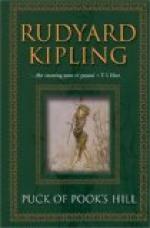‘So I saw in their faces when we met,’ said Kadmiel. ’Yet surely, surely they are taught to spit upon Jews?’
‘Are they?’ said Dan, much interested. ‘Where at?’
Puck fell back a pace, laughing. ’Kadmiel is thinking of King John’s reign,’ he explained. ‘His people were badly treated then.’
‘Oh, we know that.’ they answered, and (it was very rude of them, but they could not help it) they stared straight at Kadmiel’s mouth to see if his teeth were all there. It stuck in their lesson-memory that King John used to pull out Jews’ teeth to make them lend him money.
Kadmiel understood the look and smiled bitterly.
’No. Your King never drew my teeth: I think, perhaps, I drew his. Listen! I was not born among Christians, but among Moors—in Spain—in a little white town under the mountains. Yes, the Moors are cruel, but at least their learned men dare to think. It was prophesied of me at my birth that I should be a Lawgiver to a People of a strange speech and a hard language. We Jews are always looking for the Prince and the Lawgiver to come. Why not? My people in the town (we were very few) set me apart as a child of the prophecy—the Chosen of the Chosen. We Jews dream so many dreams. You would never guess it to see us slink about the rubbish-heaps in our quarter; but at the day’s end—doors shut, candles lit—aha! then we became the Chosen again.’
He paced back and forth through the wood as he talked. The rattle of the shot-guns never ceased, and the dogs whimpered a little and lay flat on the leaves.
’I was a Prince. Yes! Think of a little Prince who had never known rough words in his own house handed over to shouting, bearded Rabbis, who pulled his ears and filliped his nose, all that he might learn—learn—learn to be King when his time came. He! Such a little Prince it was! One eye he kept on the stone-throwing Moorish boys, and the other it roved about the streets looking for his Kingdom. Yes, and he learned to cry softly when he was hunted up and down those streets. He learned to do all things without noise. He played beneath his father’s table when the Great Candle was lit, and he listened as children listen to the talk of his father’s friends above the table. They came across the mountains, from out of all the world, for my Prince’s father was their counsellor. They came from behind the armies of Sala-ud-Din: from Rome: from Venice: from England. They stole down our alley, they tapped secretly at our door, they took off their rags, they arrayed themselves, and they talked to my father at the wine. All over the world the heathen fought each other. They brought news of these wars, and while he played beneath the table, my Prince heard these meanly dressed ones decide between themselves how, and when, and for how long King should draw sword against King, and People rise up against People. Why not? There can be no war without gold, and we Jews know how the earth’s gold moves with the seasons, and the crops, and the winds; circling and looping and rising and sinking away like a river—a wonderful underground river. How should the foolish Kings know that while they fight and steal and kill?’




